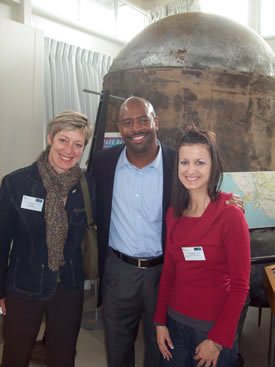| 90% of readers believe that mobile technology and increasing online access make social media an ideal platform for attracting younger generations of South Africans to SET fields of study. | |
| 5% of readers say they are not sure. | |
| 5% of readers say that this time and money could be better spent on outreach projects. |
Exoplanet extraordinaire… Only a few weeks into the new year and already four new exoplanets have been discovered. An exoplanet is a planet that orbits a star in a solar system other than that of the earth. It looks as though 2012 is going to be a year filled with discovery.
Read more
IN THE NEWS
Space visits Cape Town
 |
Lizna Retief (left), an educator from Ermelo, and co-delegate Loudeau Groenewaldt (right), with NASA astronaut Leland Melvin (middle) at the IAF Educator Professional Development Programme, which formed part of the International Astronautical Congress in Cape Town in October last year. |
|
Cape Town crawled with space enthusiasts in early October last year, during the International Astronautical Congress. GetS.E.T.go! takes a look at some of the space science activities that formed part of the event.
For the first time on the African continent, the 62nd International Astronautical Congress (IAC2011) took place from 3 to 7 October. The initiative was organised by the International Astronautical Federation (IAF), together with the International Academy of Astronautics and the International Institute of Space Law. The NRF was the local host of the IAC2011, while SAASTA managed the focus areas dealing with education, outreach and awareness.
Through funding from the Department of Science and Technology (DST), SAASTA managed to send 45 educators to attend the IAC2011 events, 21 of who were from the Western Cape, with the rest coming from the eight other provinces.
EVENT: The Space Education and Outreach Committee (SEOC)
The SEOC presented a programme geared towards educators at primary and secondary levels from South Africa. Named the IAF Educator Professional Development Programme 2011, it provided educators with the knowledge, tools and confidence required to bring space into their classrooms in order to inspire the next space generation. The two-day workshop was held at the South African Astronomical Observatory (SAAO), and was facilitated by graduate students sponsored by the Canadian Space Agency (CSA) and USA’s National Aeronautics and Space Administration (NASA). The programme was separated into two breakaway sessions focusing on primary and secondary school groups respectively.
“Thank you for the wonderful opportunity to be part of this workshop and conference, and for the exposure, information and opportunity to interact and share knowledge with various people from different countries. We got more than we expected. All that is left for us to do is implement what we have learnt.”
- PP Mashalaba, Deputy Chief Education Specialist, MSTE Coordination (Eastern Cape Department of Education)
“This opportunity has rekindled my enthusiasm for this subject. Learners often ask about outer space and planets and I will enjoy sharing the knowledge I have gained.”
- Lizna Retief, science educator (Ermelo Hoërskool)
EVENT: Space Education Board (ISEB)
Together with NASA, ISEB gave grade 8 learners from the Western Cape the chance to learn more about their role in future space activities. Learners were invited into the “student zone” to discover the role they can play in the future of space technology and exploration.
Titled “You are the world’s future in space”, the event comprised of both hands-on and demonstration-based activities to introduce learners to key space-related concepts such as alternative energy, astronomy and robotics. Activities also taught learners about the wide variety of career possibilities in the space field – from engineering and scientific research to communication and policy making.
EVENT: The Space Generation Congress (SGC)
The SGC is an annual conference hosted by the Space Generation Advisory Council (SGAC) – a non-governmental organisation with permanent observer status in the United Nations Committee on the Peaceful Uses of Outer Space, and a network of thousands of international university students and young professionals, mainly between 18 and 35 years old.
SAASTA sponsored the SGC outreach working group session and its related implementations, aimed at advancing space science outreach attempts in South Africa. Bradford Inngs and Kevin Govender were content expert and speaker respectively. Some 16 participants attended the breakaway session on outreach and awareness, and a position paper was presented to the congress for submission to the UN for comment. The topic for the outreach session was “Space for developing regions: The African case study”, and the group examined both the benefits from space for developing countries as well as the necessary steps to implement space technologies into these societies.
As part of the negotiations for the sponsorship, SAASTA asked SGC delegates to participate in outreach activities during their stay in South Africa. These included public lectures, rocket-building exercises, astronomy-related activities such as stargazing, and a simulated lunar rover uplink through which members of the public are able to control a rover in a simulated lunar environment on the other side of the world.
